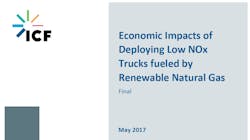Economic Impacts of Deploying Low NOx Trucks fueled by Renewable Natural Gas
A new jobs study reveals that deploying trucks fueled by renewable natural gas could create up to 130,000 new jobs and add $14 billion to California’s economy. The ‘RNG Jobs Report’ examines the economic potential of fueling heavy-duty trucks with renewable natural gas produced in California, instead of being powered by petroleum-based diesel. The study was released jointly by the Coalition for Renewable Natural Gas (RNG Coalition) and the California Natural Gas Vehicle Coalition (CNGVC) at the Advanced Clean Transportation (ACT) Expo.
A switch to renewable natural gas trucks could quickly help California achieve its air quality, greenhouse gas emissions, and climate change-related goals, the two coalitions say. More than 95 percent of the trucks on California roads currently use petroleum-based diesel fuel and are a major source of particulate, nitrogen oxide (NOx) and GHG emissions. In Southern California, the heavy-duty trucking sector is the single largest source of NOx emissions, which combine with other pollutants to form both ground-level ozone and fine particulates, also known as PM2.5. Those pollutants are responsible for a wide range of health impacts from exacerbating asthma to premature deaths. In fact, the ports and related goods-movement activity emit more than 35 percent of all smog-forming pollutants in the region.
Renewable natural gas (RNG or Biomethane) is produced from methane captured as organic materials decompose in renewable waste streams, including from dairies, agriculture, landfills, and wastewater treatment plants. By capturing and converting methane for use as a substitute or blended fuel, transportation companies and fleets can reduce their greenhouse gas (GHG) emissions by as much as 70 percent. The latest heavy-duty renewable natural gas engines reduce NOx emissions by 90 percent, according to the U.S. Environmental Protection Agency.
